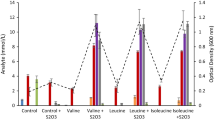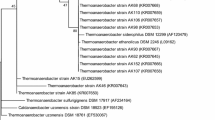Abstract
The bioprocessing of amino acids to branched-chain fatty acids and alcohols is described using Thermoanaerobacter strain AK85. The amino acid utilization profile was evaluated without an electron scavenger, with thiosulfate, and in a co-culture with a methanogen. There was an emphasis on the production of branched-chain alcohols and fatty acids from the branched-chain amino acids, particularly the influence of culture conditions which was investigated using isoleucine, which revealed that the concentration of thiosulfate was of great importance for the branched-chain alcohols/fatty acid ratio produced. Kinetic studies show that branched-chain amino acid fermentation is relatively slow as compared to glucose metabolism with the concentrations of the branched-chain alcohol increasing over time. To understand the flow of electrons and to investigate if the branched-chain fatty acid was being converted to branched-chain alcohol, enzyme assays and fermentation studies using 13C-labeled leucine and 3-methyl-1-butyrate were performed which indeed suggest that carboxylic acid reduction is a source of branched-chain alcohols when Thermoanaerobacter strain AK85 was cultivated with thiosulfate as an electron scavenger.








Similar content being viewed by others
Abbreviations
- AA:
-
Amino acid
- ADH:
-
Alcohol dehydrogenase
- AOR:
-
Aldehyde oxidase
- BCAA:
-
Branched-chain amino acid
- BCFA:
-
Branched-chain fatty acid
- BCOH:
-
Branched-chain alcohol
- BM:
-
Basal mineral medium
- Ile:
-
Isoleucine
- Leu:
-
Leucine
- NMR:
-
Nuclear magnetic resonance
- Val:
-
Valine
References
Andreesen JR (1994) Glycine metabolism in anaerobes. Ant Van Leeuw 66:223–237
Barker HA (1981) Amino acid degradation by anaerobic bacteria. Annu Rev Microbiol 50:23–40. https://doi.org/10.1146/annurev.bi.50.070181.000323
Bradford MM (1976) A rapid and sensitive method for the quantitation of microgram quantities of protein utilizing the principle of protein–dye binding. Anal Biochem 72:248–254
Bryant FO, Wiegel J, Ljungdahl LG (1988) Purification and properties of primary and secondary alcohol dehydrogenases from Thermoanaerobacter ethanolicus. Appl Environ Microbiol 54:460–465
Bryant FO, Wiegel J, Ljungdahl LG (1992) Comparison of alcohol dehydrogenase from wild-type and mutant strain, JW200 Fe 4, of Thermoanaerobacter ethanolicus. Appl Environ Microbiol 37:490–495. https://doi.org/10.1007/BF00180975
Brynjarsdottir H, Wawiernia B, Orlygsson J (2012) Ethanol production from sugars and complex biomass by Thermoanaerobacter AK5: the effect of electron-scavenging systems on end-product formation. Energy Fuels 26:4568–4574
Chades T, Scully SM, Ingvadottir EM et al (2018) Fermentation of mannitol extracts from brown macro algae by thermophilic Clostridia. Front Microbiol 9:1–13. https://doi.org/10.3389/fmicb.2018.01931
Cline JD (1969) Spectrophotometric determination of hydrogen sulfide in natural waters. Limnol Oceanogr 14:454–458
Elsden SR, Hilton MG (1978) Volatile acid production from threonine, valine, leucine and isoleucine by clostridia. Arch Microbiol 117:165–172. https://doi.org/10.1007/BF00402304
Faber K (2011) Biotransformations in organic chemistry: a textbook, 5th edn. Springer, New York
Fardeau ML, Patel BKC, Magot M et al (1997) Utilization of serine, leucine, isoleucine, and valine by Thermoanaerobacter brockii in the presence of thiosulfate or Methanobacterium sp. as electron acceptors. Anaerobe 3:405–410. https://doi.org/10.1006/anae.1997.0126
Faudon C, Fardeau ML, Heim J et al (1995) Peptide and amino acid oxidation in the presence of thiosulfate by members of the genus Thermoanaerobacter. Curr Microbiol 31:152–157
Fibla J, Gonzhlez-Duarte R (1993) Colorimetric assay to determine alcohol dehydrogenase activity. J Biochem Biophys Methods 26:87–93
Hitschler L, Kuntz M, Langschied F et al (2018) Thermoanaerobacter species differ in their potential to reduce organic acids to their corresponding alcohols. Appl Microbiol Biotechnol 102:8465–8476. https://doi.org/10.1007/s00253-018-9210-3
Hough JS, Stevens R (1961) Beer flavour IV. Factors affecting the production of fusel oil. J Ind Brew 67:488–494
Isom CE, Nanny MA, Tanner RS (2015) Improved conversion efficiencies for n-fatty acid reduction to primary alcohols by the solventogenic acetogen “Clostridium ragsdalei”. J Ind Microbiol Biotechnol 42:29–38. https://doi.org/10.1007/s10295-014-1543-z
Jessen JEJ, Orlygsson J (2012) Production of ethanol from sugars and lignocellulosic biomass by Thermoanaerobacter J1 isolated from a hot spring in Iceland. J Biomed Biotechnol. https://doi.org/10.1155/2012/186982
Lamed RJ, Zeikus JG (1981) Novel NADP-linked alcohol-aldehyde/ketone oxidoreductase in thermophilic ethanologenic bacteria. Biochem J 195:183–190
McInerney MJ (1988) Anaerobic hydrolysis and fermentation of fats and proteins. In: Zehnder AJB (ed) Biology of anaerobic microorganisms. Wiley, New York, pp 373–415
Orlygsson J, Baldursson SRB (2007) Phylogenetic and physiological studies of four hydrogen-producing thermoanareobes. Iceland Agr Sci 20:93–105
Orlygsson J, Anderson R, Svensson BH (1995a) Alanine as an end product during fermentation of monosaccharides by Clostridium strain P2. Ant Van Leeuw 68:273–280
Orlygsson J, Houwen FP, Svensson BH (1995b) Thermophilic anaerobic amino acid degradation: deamination rates and end product formation. Appl Microbiol Biotechnol 43:235–241
Orlygsson J, Krooneman J, Collins MD et al (1996) Clostridium acetireducens sp. nov., a novel amino acid-oxidizing, acetate-reducing anaerobic bacterium. Int J Syst Bacteriol 46:454–459
Phillips RS, Pham VT, Zheng C et al (1992) Effects of temperature on stereochemistry of alcohol dehydrogenases from Thermoanaerobacter ethanolicus. In: Tramper J (ed) Biocatalysis in non-conventional media. Elsevier BV, New York, pp 267–273
Scully SM, Orlygsson J (2014) Branched-chain alcohol formation from branched-chain amino acids by Thermoanaerobacter brockii and Thermoanaerobacter yonseiensis. Anaerobe 30:82–84. https://doi.org/10.1016/j.anaerobe.2014.09.003
Scully SM, Orlygsson J (2015) Amino acid metabolism of Thermoanaerobacter strain AK90: the role of electron-scavenging systems in end product formation. J Amino Acids. https://doi.org/10.1155/2015/410492
Scully SM, Iloranta P, Myllymaki P et al (2015) Branched-chain alcohol formation by thermophilic bacteria within the genera of Thermoanaerobacter and Caldanaerobacter. Extremophiles 19:809–818. https://doi.org/10.1007/s00792-015-0756-z
Scully SM, Brown A, Ross AB et al (2019) Biotransformation of organic acids to their corresponding alcohols by Thermoanaerobacter pseudoethanolicus. Anaerobe 57:28–31. https://doi.org/10.1016/j.anaerobe.2019.03.004
Slobodkin AI, Tourova TP, Kuznetsov BB et al (1999) Thermoanaerobacter siderophilus sp. nov., a novel dissimilatory Fe(III)-reducing, anaerobic, thermophilic bacterium. Int J Syst Bacteriol 49:1471–1478. https://doi.org/10.1099/00207713-49-4-1471
Tomás AF, Karakashev D, Angelidaki I (2013) Thermoanaerobacter pentosaceus sp. nov., an anaerobic, extreme thermophilic, high ethanol-yielding bacterium isolated from household waste. Int J Syst Evol Microbiol 63:2396–2404
Westley J (1987) Thiocyanate and thiosulfate. Methods Enzymol 143:22–25
Wiegel J, Ljungdahl LG (1981) Thermoanaerobacter ethanolicus gen. nov., spec. nov., a new, extreme thermophilic, anaerobic bacterium. Arch Microbiol 128:343–348. https://doi.org/10.1007/BF00405910
Xue Y, Xu Y, Liu Y et al (2001) Thermoanaerobacter tengcongensis sp. nov., a novel anaerobic, saccharolytic, thermophilic bacterium isolated from a hot spring in Tengcong, China. Int J Syst Evol Microbiol 51:1335–1341. https://doi.org/10.1099/00207713-51-4-1335
Zhou J, Shao X, Olson DG et al (2017) Determining the roles of the three alcohol dehydrogenases (AdhA, AdhB and AdhE) in Thermoanaerobacter ethanolicus during ethanol formation. J Ind Microbiol Biotechnol 44:745–757. https://doi.org/10.1007/s10295-016-1896-6
Ziegelmann-Fjeld KI, Musa MM, Phillips RS et al (2007) A Thermoanaerobacter ethanolicus secondary alcohol dehydrogenase mutant derivative highly active and stereoselective on phenylacetone and benzylacetone. Protein Eng Des Sel 20:47–55. https://doi.org/10.1093/protein/gzl052
Acknowledgements
The authors gratefully acknowledge financial support from Landsvirkjun, Reykjavik, Iceland (project number NÝR-08-2015). The authors appreciate the support of Sigríður Jónsdóttir of the Science Institute at the University of Iceland for her assistance with obtaining NMR spectra.
Author information
Authors and Affiliations
Corresponding author
Ethics declarations
Conflict of interest
The authors declare that they have no conflict of interest.
Human and animal rights statement
For this type of study, formal consent is not required. This article does not contain any studies with human participants or animals performed by any of the authors.
Informed consent
Informed consent for this type of study is not required.
Additional information
Handling Editor: J. G. López.
Publisher's Note
Springer Nature remains neutral with regard to jurisdictional claims in published maps and institutional affiliations.
Electronic supplementary material
Below is the link to the electronic supplementary material.
726_2019_2744_MOESM1_ESM.docx
Supplementary Fig. 1 Fermentation kinetics of Thermoanaerobacter strain AK85 grown on of 20 mM Valine (A), 20 mM Leucine (B) in the presence of thiosulfate (20 mM). Values represent the average of triplicate fermentations with standard deviation presented as error bars (DOCX 29 kb)
Rights and permissions
About this article
Cite this article
Scully, S.M., Orlygsson, J. Branched-chain amino acid catabolism of Thermoanaerobacter strain AK85 and the influence of culture conditions on branched-chain alcohol formation. Amino Acids 51, 1039–1054 (2019). https://doi.org/10.1007/s00726-019-02744-z
Received:
Accepted:
Published:
Issue Date:
DOI: https://doi.org/10.1007/s00726-019-02744-z




